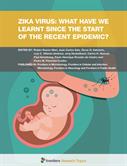Zika Virus: What Have We Learnt Since the Start of the Recent Epidemic?

Author(s)
Oscar D. Salomon
Luis C. Villamil-Jimenez
Jorg Heukelbach
Pedro M. Pimentel-Coelho
Paulo Henrique Rosado-de-Castro
Ruben Bueno-Mari
Juan-Carlos Saiz
Carlos H. Alencar
Paul Armstrong
Language
EnglishAbstract
The considerable number of viral infectious disease threats that have emerged since the beginning of the 21st century have shown the need to dispose global and coordinated responses to fight properly and efficiently against them. Severe acute respiratory syndrome (2003), avian influenza in humans (2005), A(H1N1) pandemic influenza (2009), Middle East respiratory syndrome coronavirus (MERS-CoV) (2012 onward) and Ebola virus disease (2014-2015) are some of the most important examples. The latest emerging and devastating threat was Zika virus, an arbovirus that provoked more than 500,000 suspicious cases in the Americas in 2016 and notable processes of social and medical alarms due to the evidence of a causal link between Zika virus and several congenital injuries, like microcephaly, as well as due to its association with neurological disorders such as Guillain-Barré syndrome in adults (PAHO, 2017). In the framework of this global response and multistrategic approach, the purpose of this Research Topic is to provide updated information and novel researches about control strategies, encompassing virological, entomological and epidemiological data, in order to reach the triad of protagonists of transmission cycles (virus, mosquitoes and humans).
Keywords
Public Health; Mosquitoes; Zika virus; Arbovirus; Microcephaly; Epidemiology; Flavivirus; Guillain-Barre SyndromeISBN
9782889454808Publisher
Frontiers Media SAPublisher website
www.frontiersin.orgPublication date and place
2018Series
Frontiers Research Topics,Classification
Neurology and clinical neurophysiology

